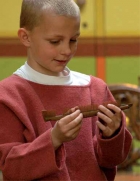Outside the classroom
Learning outside the classroom is not just about making visits. It is quite simply about the world beyond the classroom whether that is places, historic sites, museums and monuments. Opportunities for engaging children on the school field whether it is building shelters re-enacting events or creating a film or walking around the locality understanding how the landscape has affected or has been affected by people and events in the past.
-

Case Study: Prehistory in the primary curriculum: A stonehenge to remember
ArticleClick to view -

The true end of archaeology?
ArticleClick to view -

Children's thinking in archaeology
ArticleClick to view -

Piecing together the puzzle: Some thoughts on historical sites
ArticleClick to view -

Making the Modern World: The shock of the real at the science museum
ArticleClick to view -

Questions you have always wanted to ask about... History and archaeology
ArticleClick to view -

Cabinets of Curiosities, The History of Museums
ArticleClick to view -

Archaeology - An approach to teaching history at Key Stage 2. Curriculum history
ArticleClick to view -

Beyond the classroom walls: museums and primary history
ArticleClick to view

